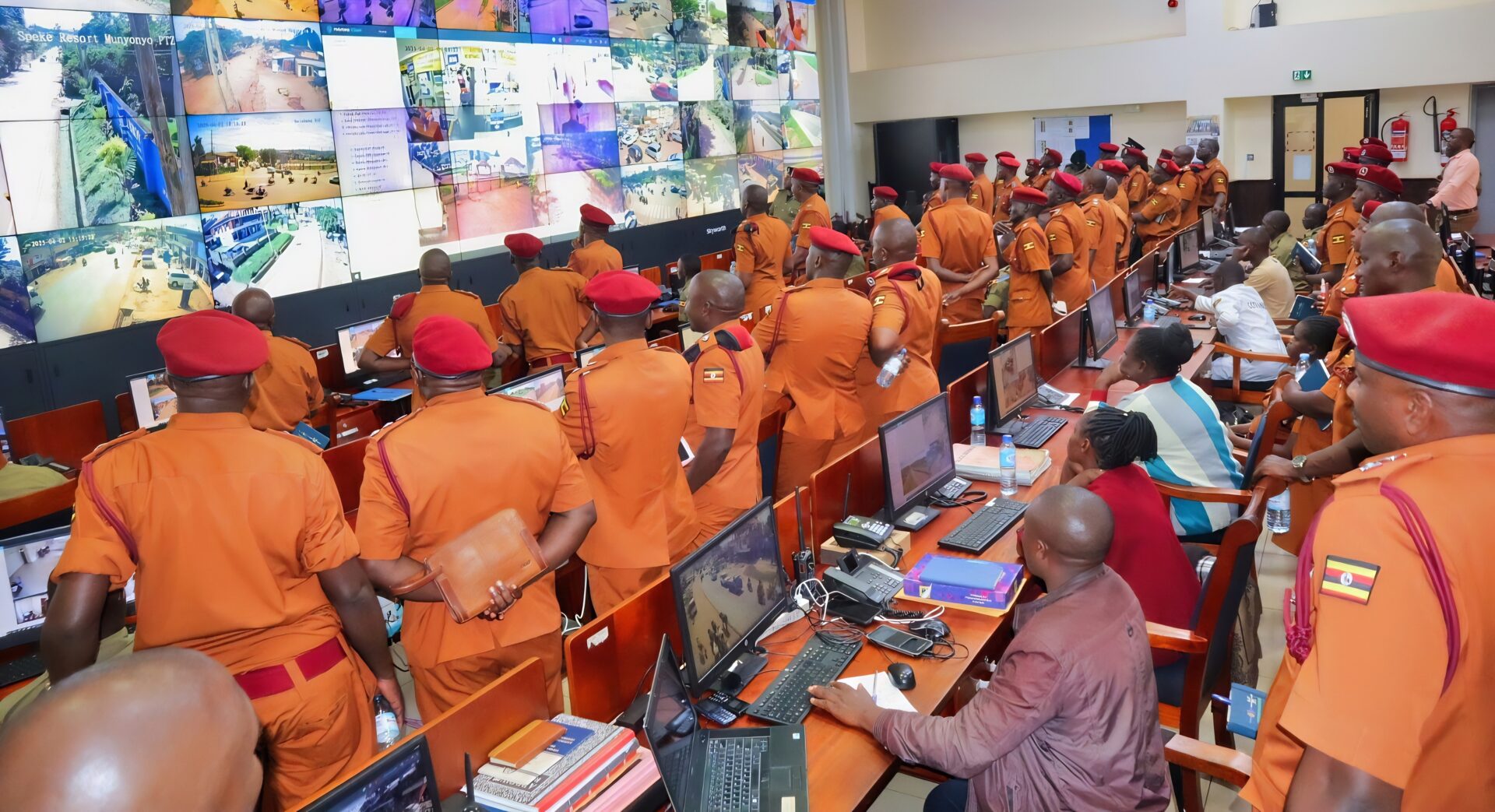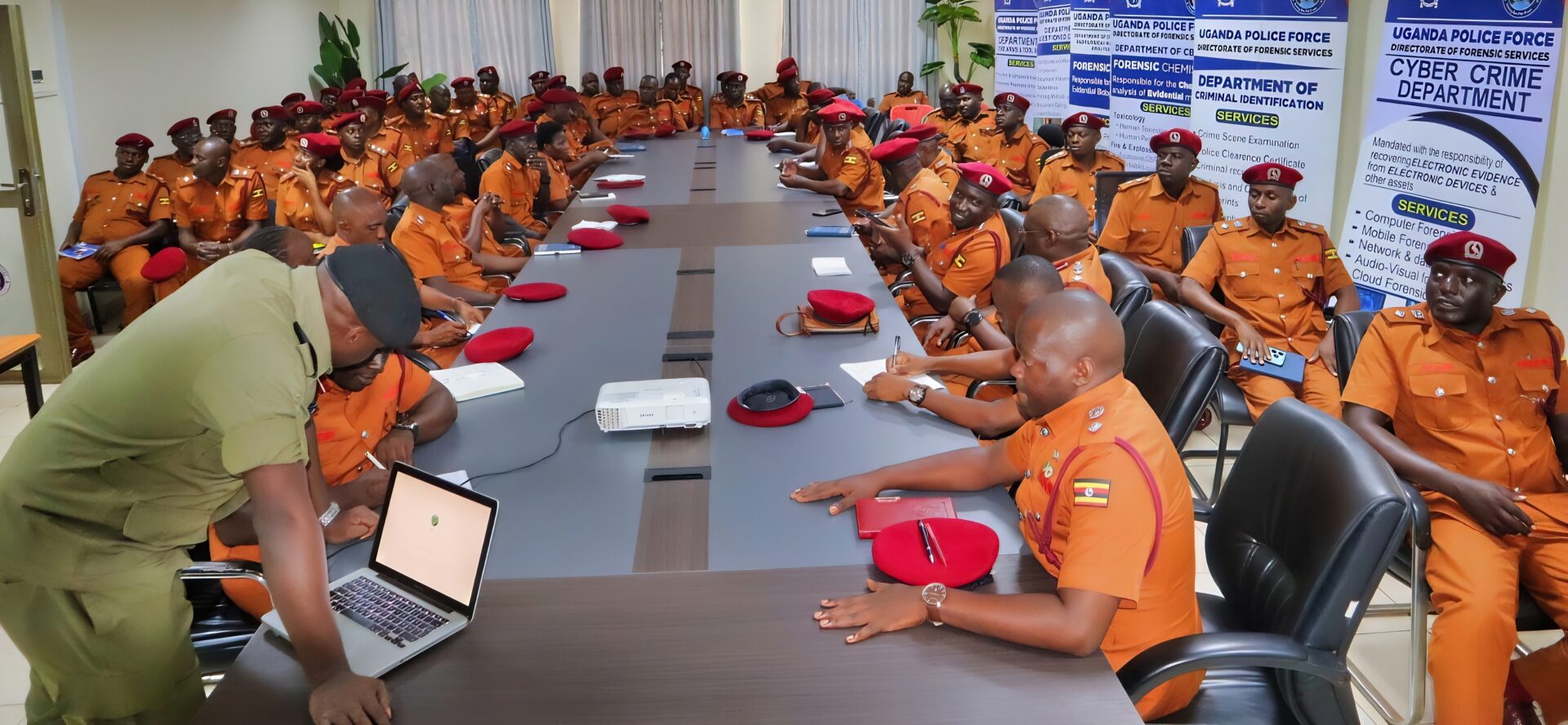The Grand Reshuffle: How Corruption Thrives in Uganda’s Penal System
In the sweltering heat of Kampala, where the air hung heavy with dust and despair, corruption festered like an open wound—a festering sore that no amount of bureaucratic bandaging could heal. Power was not a privilege earned through merit, but a currency traded in shadowy corridors, whispered deals sealed over lukewarm Tuskers in dimly lit bars. It was here, amidst this toxic miasma, that the Commissioner General of Prisons unveiled his grand reshuffle—a spectacle so bizarre it bordered on theatrical absurdity, yet so sinister it left even the most jaded observers squirming.

This wasn’t reform; it was rearrangement—a macabre masquerade designed to give the illusion of progress while ensuring the same old players remained firmly entrenched in their gilded cages. The announcement came without fanfare, just the creak of bureaucratic machinery grinding into motion, its rusted gears lubricated by ambition, greed, and desperation. To call it change would be laughable; to call it survival might be closer to the truth.
Act I: The Players Take Their Positions
The reshuffle began at Prisons Headquarters, where the Commissioner General—an ageing lion whose roar had long since faded—sat ensconced behind his mahogany desk, signing off on transfers as if they were chess moves in a game he had already lost. Each appointment carried its own peculiar brand of cruelty, irony, or outright lunacy.
- George Godwin Lenga (ACP) : Promoted to Acting Commissioner for Education Services, George was promptly dispatched to oversee inmate literacy programs. But what kind of education could one expect from a man who once confiscated textbooks because “reading made prisoners too clever”? His promotion was less about enlightenment and more about keeping him busy enough to stop asking awkward questions about missing funds.
- Fred Kajubi Kayongo (Ag CP) : Reassigned to Product Promotion (Marketing), Fred’s new role involved turning prison workshops into profit-making ventures. In theory, this sounded noble—teaching inmates skills like carpentry and tailoring. In practice, it meant selling substandard furniture at inflated prices to government offices and pocketing the difference. When challenged, Fred would shrug and say, “It’s capitalism, isn’t it?”
- Gorrete Namubiri (ASP) : Transferred to ICT, Gorrete found herself in charge of implementing a digital filing system she barely understood. Her predecessor had been fired for “incompetence,” though rumours suggested he’d actually blown the budget on outdated servers sold to him by a cousin. Gorrete spent her first week Googling terms like “cloud storage” and “firewall,” only to discover that half the prison computers still ran Windows 98.
Meanwhile, Jackson Bright Nsbugga and Nickson Katsigazi , newly appointed to Custodial Services and General Administration respectively, embarked on a silent rivalry to see who could extract more bribes from desperate families visiting inmates. Their competition turned vicious when Jackson accused Nickson of stealing his stash of contraband cigarettes, leading to a shouting match in the cafeteria that ended with both men being temporarily suspended—and then reinstated after paying hefty fines directly into the Commissioner’s personal account.
Act II: Regional Rivalries and District Dramas
Out in the regions, the reshuffle unleashed chaos worthy of a Shakespearean tragedy—or perhaps a slapstick comedy, depending on your perspective.
- Geoffrey Natabona Mangeni (SSP) : Appointed RPC North Eastern Region, Geoffrey arrived in Moroto armed with grand plans to “modernise” local facilities. Within days, he clashed with tribal elders, who accused him of disrespecting cultural traditions by forbidding prisoners to brew waragi during festivals. Geoffrey retaliated by banning all visitors, sparking protests outside the gates. The stand-off lasted three weeks until Geoffrey mysteriously fell ill after drinking water from a suspiciously murky well. Rumours spread that someone had poisoned him, though nothing was ever proven.
- Felex Mugasha (SSP) : Taking over as RPC Southern Region, Felex brought his trademark charm and cunning to Masaka. He quickly ingratiated himself with local politicians by promising to “streamline operations” (read: eliminate whistleblowers). His reign of terror included firing anyone who dared question his methods and replacing them with loyalists willing to do his bidding—for a price, of course.
At the district level, things grew even stranger. Edson Mubone , newly minted DPC of Masindi, introduced mandatory yoga sessions for inmates, claiming it would reduce violence. Predictably, the prisoners hated it, and within a month, two riots broke out during downward dog poses. Meanwhile, Fred Soyekwo, now DPC of Kabale, became obsessed with building a chicken farm inside the prison compound. Despite repeated warnings from engineers that the structure was unsafe, Fred pressed ahead, convinced it would make him rich. When the roof collapsed under torrential rains, killing several chickens and injuring three inmates, Fred blamed climate change and refused to take responsibility.
Act III: The Underlings’ Revolt
Among the rank-and-file officers, discontent simmered. Seventy-six Deputy O/Cs have been appointed nationwide, ostensibly to bolster middle management. In reality, they were little more than glorified errand runners, tasked with everything from counting bed nets to confiscating illicit radios. Many resented their new roles, viewing them as punishment rather than promotion.
One such officer, Charles Feni , found himself stationed at Bubukwanga Prisons, a remote outpost infamous for its dilapidated infrastructure and unruly inmates. Charles soon discovered that his predecessor had lined the walls with mattresses stolen from the medical ward to muffle screams during interrogations. Determined to make a name for himself, Charles decided to replace the mattresses with soundproof panels—but only after securing a lucrative kickback from the supplier. Unfortunately, the panels turned out to be flammable, and when a kitchen fire broke out, the entire wing went up in flames. Miraculously, no one died, but Charles was unceremoniously sacked and replaced by a younger, cheaper officer eager to prove his worth.
Elsewhere, Rogers Kagenda , newly appointed OC of Kakuto Prisons, embarked on a quixotic quest to transform the facility into a model institution. He painted murals on the walls, installed solar panels, and even started a library stocked with donated books. For a brief moment, hope flickered like a candle in the darkness. Then, one night, Rogers disappeared without a trace, leaving behind only a cryptic note scrawled on the back of a receipt: “Power corrupts. Absolute power corrupts absolutely.”

Epilogue: The Illusion of Change
As the dust settled, it became clear that the reshuffle had achieved nothing meaningful. Corruption still thrived, conditions remained abysmal, and the lives of inmates and staff alike continued to teeter precariously on the edge of despair. Yet, somehow, life went on. Families queued outside prison gates bearing food parcels, officers shuffled papers in dingy offices, and somewhere deep within the labyrinthine bureaucracy, the Commissioner General sat smugly behind his desk, congratulating himself on a job well done.
For those caught in the crossfire—the forgotten souls trapped between ambition and apathy—the reshuffle was neither triumph nor tragedy. It was simply another chapter in the endless saga of survival, a reminder that in the world of Ugandan prisons, the only constant was change… and the certainty that nothing would ever truly change.
Key Highlights of the Reshuffle
The Grand Reshuffle: A Symphony of Shadows and Schemes
Kampala simmered under a relentless sun, its streets choked with dust and despair. The air was thick not only with humidity but also with whispers—whispers of deals struck in secret, favours exchanged like currency, and ambitions cloaked in deception. At the heart of this tangled web sat the Uganda Prisons Service, an institution as broken as it was vital. And now, amidst the chaos, the Commissioner General of Prisons unveiled his grand reshuffle—a spectacle that oscillated between cruelty, absurdity, and outright farce.

This wasn’t reform; it was rearrangement. Beneath the polished veneer of progress lay a labyrinth of corruption, incompetence, and sinister intent. Each appointment at Prisons Headquarters told a story—sometimes tragic, sometimes comical, always deeply human.
Act I: The Lofty Titles and Empty Promises
- George Godwin Lenga (ACP): Acting Commissioner for Education Services
George Godwin Lenga strode into his new office at Prisons Headquarters with the confidence of a man who believed titles mattered more than deeds. His promotion to Acting Commissioner for Education Services sounded impressive enough to fool outsiders, but those within the system knew better. George’s idea of “professional development” wasn’t about empowering inmates or improving skills—it was about teaching them how to craft better bribes. After all, if you couldn’t beat the system, why not exploit it?
His transfer from Moroto hinted at darker truths. Rumour had it he’d overstayed his welcome there, having exhausted every avenue for personal enrichment. When local elders complained about missing food supplies meant for inmates, George shrugged and blamed logistical delays. But when a journalist uncovered crates of maize being sold on the black market bearing prison seals, whispers grew louder. Now, ensconced in Kampala, George hoped to start anew—or at least until someone else took the fall.
- Fred Kajubi Kayongo (Ag CP): Product Promotion (Marketing)
Fred Kajubi Kayongo entered his new role with the swagger of a snake oil salesman peddling miracle cures. Appointed to oversee Prison Industries—a euphemism so transparent it bordered on satire—Fred’s real job was simple: turn prisons into profit-making machines. Craftsmanship? Innovation? Those were just buzzwords. What truly mattered was selling inmate-made crafts, questionable agricultural produce, and even recycled uniforms back to government offices at inflated prices.
Fred thrived in this murky world of kickbacks and cronyism. He’d already lined up suppliers willing to provide substandard materials at exorbitant rates, knowing full well they’d pocket half the budget before anything reached the workshops. One particularly audacious scheme involved marketing prison-grown onions as “organic” despite evidence of pesticide contamination. When challenged, Fred grinned wolfishly and said, “If people want organic, we give them organic.”
- Gorrete Namubiri (ASP): Transferred to ICT
Gorrete Namubiri blinked at her new assignment letter as though reading hieroglyphics. ICT? She barely knew how to send an email, let alone manage a department responsible for modernising operations. Yet here she was, thrust into a role she neither wanted nor understood. Her appointment reeked of nepotism—her cousin held a senior position at MTN Uganda, and everyone assumed strings had been pulled.

Her first day was predictably disastrous. Tasked with implementing a digital filing system, Gorrete spent hours trying to figure out why none of the computers could connect to the internet. When she finally called IT support, they informed her the network hadn’t worked since 2018 because no one had paid the bill. Gorrete sighed, ordered tea, and decided to focus on what she did best: avoiding responsibility.
- Jackson Bright Nsbugga (ASP) & Nickson Katsigazi (ASP): Custodial Services and General Administration
Jackson Bright Nsbugga and Nickson Katsigazi stared at their respective appointment letters with equal parts dread and resignation. Custodial Services and General Administration were two departments notorious for inefficiency and graft—a perfect match for officers whose careers had plateaued due to incompetence rather than merit.
Jackson quickly realised his primary duty would involve negotiating bribes with families desperate to visit inmates. It was a delicate dance—one wrong step could lead to accusations of favouritism, yet too little effort meant missed opportunities for enrichment. Nickson, meanwhile, found himself buried under mountains of paperwork, much of which seemed designed solely to justify budgets that disappeared faster than water in a drought-stricken village.
Their rivalry began almost immediately. Both men vied for control over lucrative smuggling routes, each determined to outdo the other. When Jackson accused Nickson of hoarding contraband cigarettes, tensions escalated into a shouting match during lunch break. The argument ended only when a senior officer intervened, reminding them that unity—not competition—was key to maintaining the status quo.
Act II: Chaos Unleashed
As news of the reshuffle spread, reactions ranged from disbelief to outright mockery. Officers whispered behind closed doors, speculating about hidden agendas and ulterior motives. Inmates, oblivious to the bureaucratic machinations above, continued their daily routines, unaware that decisions made in Kampala would ripple through their lives like waves crashing against rocks.
- A Bizarre Training Session:
George Godwin Lenga kicked off his tenure by organising a workshop titled “Empowering Inmates Through Entrepreneurship.” Attendees included a mix of bewildered prisoners and equally confused trainers. During one session, an inmate asked whether entrepreneurship included learning how to evade taxes. George chuckled nervously and changed the subject. - Fred’s Onion Scandal:
Fred Kajubi Kayongo’s onion scheme unraveled spectacularly when a shipment intended for a government cafeteria was rejected due to foul odour. Laboratory tests revealed traces of banned chemicals, prompting outrage from health officials. Fred responded by blaming the supplier, conveniently forgetting he’d personally signed off on the purchase order. - Gorrete’s Digital Disaster:
Gorrete Namubiri’s attempts at modernisation culminated in a catastrophic server crash that wiped out months’ worth of data. Instead of addressing the issue, she declared it a “learning experience” and suggested reverting to paper records temporarily. Temporary, of course, became permanent. - The Great Cigarette War:
Tensions between Jackson and Nickson reached fever pitch when a cache of smuggled cigarettes went missing. Accusations flew, alliances shifted, and ultimately, both men were suspended pending investigation. Their replacements arrived eager to prove themselves—but soon discovered the same toxic culture that had consumed their predecessors.
Act III: Reflections and Revelations
Amidst the madness, moments of clarity emerged. For every act of cruelty, there was a glimmer of humanity. For every bizarre twist, a kernel of truth. And for every sinister deed, a reminder that hope, however fragile, refused to die.
One evening, as dusk painted the sky in hues of gold and crimson, Gorrete Namubiri sat alone in her office, staring at the blinking cursor on her computer screen. She thought about her cousin at MTN, about the countless times she’d relied on connections rather than competence to climb the ladder. For the first time, she wondered whether change was possible—not just within the system, but within herself.
Elsewhere, Jackson Bright Nsbugga stood outside the prison gates, watching families queue patiently to see their loved ones. He remembered his childhood visits to his father, incarcerated for a crime he swore he didn’t commit. That memory lingered, haunting him like a ghost, whispering that perhaps redemption wasn’t entirely unreachable.
And then there was Fred Kajubi Kayongo, seated in his opulent chair, counting bundles of cash tucked away in a briefcase. As he lit a cigarette, he paused, considering the cost of his ambition—not just to others, but to himself. Was this wealth worth the weight of guilt pressing down on his chest?
Epilogue: The Illusion of Progress
In the end, the reshuffle achieved nothing meaningful. Corruption still festered, inefficiency persisted, and lives remained trapped in cycles of despair. Yet, somehow, life went on. Families brought food parcels, officers filed reports, and somewhere deep within the bowels of bureaucracy, the Commissioner General smiled smugly, convinced he’d orchestrated greatness.
But beneath the surface, something stirred—a flicker of resistance, a whisper of rebellion. Perhaps tomorrow would bring change. Or perhaps it wouldn’t. Either way, the story of the Uganda Prisons Service continued, a tapestry woven from threads of cruelty, humour, tragedy, and hope.
The Grand Reshuffle: Shadows Over the Regions
In the sprawling expanse of Uganda’s penal system, where corruption thrived like a stubborn weed and ambition often masked incompetence, the reshuffle at Regional Prisons Command (RPC) levels unfolded with all the drama of a Shakespearean tragedy—or perhaps a slapstick comedy, depending on how one viewed it. The two most prominent figures in this act were Geoffrey Natabona Mangeni and Felex Mugasha, each dispatched to their respective fiefdoms not because they deserved it but because someone higher up needed them out of the way—or, failing that, far enough away to cause minimal damage.
Act I: Exile to Moroto – Geoffrey’s Ordeal
Geoffrey Natabona Mangeni (SSP) arrived in Moroto under circumstances that could only be described as punitive. Replacing George Godwin Lenga—a man whose tenure had ended ignominiously—was no prize; it was exile cloaked in flattery. Geoffrey’s reputation preceded him: a stickler for rules, a thorn in the side of local politicians, and an officer who believed, perhaps naïvely, that integrity still held value within the service. His refusal to “play ball” with influential figures back in Kampala had earned him enemies in high places, and now he found himself banished to the arid hinterlands of northeastern Uganda.
Moroto greeted Geoffrey with its usual hostility: scorching heat, dusty winds, and a prison population rife with tribal tensions. On his first day, Geoffrey donned his crispest uniform, determined to project authority. But authority, as he soon learned, meant little here. Within hours, he faced resistance from tribal elders who accused him of disrespecting cultural traditions by forbidding inmates from brewing waragi during festivals. Waragi, they argued, wasn’t just alcohol—it was a lifeline, a symbol of community. Geoffrey stood firm, citing regulations about contraband and safety. The elders retaliated by organising protests outside the gates, chanting slogans that bordered on rebellion.
Desperate to assert control, Geoffrey introduced stricter measures: random cell searches, mandatory headcounts three times a day, and a crackdown on smuggling networks. While these actions might have seemed prudent elsewhere, in Moroto they ignited fury. Inmates began staging hunger strikes, while guards muttered darkly about sabotage. One night, Geoffrey woke to find his office door smeared with animal blood—a warning, or perhaps a curse. He cleaned it silently, refusing to show fear, though deep down, doubt gnawed at him. Was this really what justice looked like?
Despite the chaos, Geoffrey clung to hope. He started small initiatives, like teaching inmates basic literacy skills, hoping to carve out a legacy even if it came at great personal cost. Yet, every success felt overshadowed by failure. When a drought hit the region, cutting off water supplies to the prison, Geoffrey appealed to the central government for aid—but received nothing but empty promises. As weeks turned into months, he began to wonder whether his principles were worth the isolation and danger. Had he been sent here to succeed—or to break?
Act II: The Masaka Mirage – Felex’s Charade
If Geoffrey’s posting to Moroto was punishment, then Felex Mugasha’s appointment as RPC Southern Region, Masaka, was pure optics—a masterstroke designed to create the illusion of progress without requiring any actual effort. Felex was a chameleon, skilled at appearing competent without ever lifting a finger. To outsiders, he radiated charm and efficiency; to those who worked closely with him, he was a black hole of mediocrity, sucking resources and opportunities into oblivion while producing nothing tangible in return.
Masaka, known for its vibrant markets and rich agricultural lands, should have been fertile ground for reform. Instead, Felex treated it like a playground for his schemes. Within days of taking over, he announced bold plans to modernise facilities, improve inmate welfare, and boost staff morale. These declarations earned him glowing praise in regional newspapers, but anyone familiar with his track record knew better. Felex’s idea of “modernisation” involved repainting crumbling walls to hide cracks, not repairing structural damage. His promise to enhance welfare translated into distributing expired food donations from local businesses—free publicity for them, zero benefit for inmates.
Behind closed doors, Felex operated a shadowy network of favours and kickbacks. Contractors eager to secure lucrative maintenance contracts lined up outside his office bearing envelopes stuffed with cash. Favoured officers received promotions based not on merit but on loyalty—or, more accurately, willingness to look the other way when funds disappeared. Junior staff whispered bitterly about favouritism, but few dared speak openly for fear of retribution.
Yet Felex’s greatest talent lay in deflecting blame. When inmates rioted over poor conditions, he blamed understaffing. When budgets ran dry mid-year, he cited unforeseen emergencies. And when auditors questioned discrepancies in financial reports, he smiled charmingly and promised full cooperation—all while ensuring key documents mysteriously went missing.
For all his flaws, however, Felex possessed a peculiar charisma. He hosted lavish dinners for local dignitaries, regaling them with tales of his “achievements.” At one such event, he unveiled a mural painted by inmates depicting scenes of harmony and rehabilitation. Critics scoffed, calling it propaganda, but Felex simply shrugged. Perception, he understood, mattered more than reality.
Act III: Collision Course
As fate would have it, Geoffrey and Felex’s paths crossed unexpectedly during a regional conference in Jinja. Both men represented starkly different approaches to leadership: Geoffrey, unyielding yet battered by circumstance; Felex, smooth-talking but hollow at the core. Their interactions crackled with tension, culminating in a heated exchange during a panel discussion on prison reform.
“You talk about change,” Geoffrey snapped, glaring at Felex across the table, “but your methods are superficial. Repainting walls doesn’t fix leaks.”
Felex smirked, leaning back in his chair. “And you think starving inmates of waragi will make them model citizens? Idealism won’t keep the lights on, my friend.”
The audience shifted uncomfortably as the debate grew heated. For a moment, it seemed Geoffrey might lunge across the table, but instead, he rose abruptly and walked out, leaving Felex to bask in smug triumph.
Later that evening, Geoffrey sat alone by Lake Victoria, staring at the moonlit waters. He thought about the choices that had led him here—the sacrifices, the battles fought and lost. Nearby, Felex lounged on a balcony, sipping whisky and laughing with colleagues. Two men, two destinies—one defined by idealism, the other by opportunism.
Epilogue: Shadows and Light
Back in Moroto, Geoffrey continued his uphill battle, clinging to fragments of hope amidst despair. Though battered and weary, he refused to surrender entirely. Perhaps his efforts wouldn’t transform the prison overnight, but maybe, just maybe, they’d plant seeds for future change.
Meanwhile, in Masaka, Felex thrived, basking in accolades while the rot beneath his polished façade deepened. Yet even he couldn’t escape unease entirely. Late at night, lying awake in his air-conditioned quarters, he sometimes wondered whether history would judge him kindly—or at all.
Their stories intertwined like threads in a tapestry, reflecting the contradictions of humanity itself: cruelty and compassion, cynicism and hope, darkness and light. And so, the grand reshuffle rolled on, a cruel dance of shadows and schemes, leaving behind echoes of laughter, tears, and whispered dreams of redemption.
The Grand Reshuffle: A Deck of Cards in the Districts
In the labyrinthine corridors of Uganda’s penal bureaucracy, where ambition mingled with corruption and incompetence masqueraded as competence, the reshuffle at the District Prisons Command (DPC) level was less a master stroke of reform and more a clumsy shuffle of a deck of cards. The new faces appointed to key positions—Edson Mubone in Masindi and Fred Soyekwo in Kabale—were not chosen for their brilliance or leadership potential. No, they were selected because mediocrity is easier to control than merit, and shuffling ineptitude around ensured no single district became too stable—or too threatening.
This game of musical chairs wasn’t about “sharing best practices,” as the official communiqué claimed. It was about dismantling power structures before they calcified into something unmanageable. And yet, what replaced these old cliques often turned out to be far worse—a toxic brew of arrogance, ignorance, and sheer absurdity that made institutional stagnation look almost appealing by comparison.
Act I: Edson Mubone – The Yoga Guru of Masindi
When Edson Mubone arrived in Masindi, he brought with him an enthusiasm that bordered on delusion. Freshly minted as DPC, Edson decided his first order of business would be to revolutionise inmate rehabilitation through… yoga. Yes, yoga. How this idea took root in his mind remained a mystery even to those closest to him. Perhaps it was inspired by a late-night infomercial he’d watched during one of Kampala’s frequent power outages. Whatever the source, Edson clung to it with evangelical fervour.
On his second day in charge, Edson called all inmates to the courtyard for a mandatory session. He stood atop a makeshift platform, wearing sweatpants two sizes too small and brandishing a whistle like a conductor leading an orchestra. “Downward dog!” he barked, blowing the whistle sharply. The inmates stared blankly, unsure whether this was some form of punishment or merely another bizarre whim of their new commander.
Predictably, chaos ensued. One inmate toppled over during a sun salutation and landed squarely on another, sparking a brawl. Another mistook “cobra pose” for an opportunity to strike back at a rival from a previous altercation. By the end of the week, two riots had erupted mid-yoga sessions, forcing Edson to abandon the initiative temporarily. Undeterred, he blamed the failures on “lack of participation” rather than his own questionable judgment.
But Edson didn’t stop there. Determined to leave his mark, he introduced mandatory art therapy classes, insisting inmates paint murals depicting themes of peace and harmony. When one mural mysteriously depicted a prison guard being eaten by a lion, Edson dismissed it as “symbolic expression.” His colleagues whispered behind closed doors that their new DPC was either mad or dangerously naïve—and possibly both.
Despite the ridicule, Edson pressed on, convinced he was transforming Masindi into a model institution. Yet beneath his bluster lay a man desperately seeking validation, hoping against hope that someone, somewhere, would recognise his efforts—even if they were misguided.
Act II: Fred Soyekwo – The Chicken King of Kabale
Meanwhile, in the verdant hills of Kabale, Fred Soyekwo embarked on a quixotic quest to turn the local prison compound into a poultry empire. Appointed DPC shortly after leaving Amuru, Fred saw Kabale’s lush landscapes as fertile ground for innovation—or at least personal enrichment. Within days of taking office, he announced plans to build a chicken farm inside the prison grounds, promising it would generate revenue and teach inmates valuable skills.
At first glance, the idea seemed reasonable enough. After all, agriculture was a cornerstone of rural life in Kabale. But Fred’s execution left much to be desired. Ignoring engineers’ warnings about unstable soil conditions, he forged ahead, constructing flimsy coops that leaned precariously every time the wind blew. When heavy rains swept through the region, the entire structure collapsed, killing dozens of chickens and injuring three inmates who’d been tasked with cleaning the pens.
Undaunted, Fred doubled down on his vision. He secured additional funding under the guise of “expanding operations,” though insiders knew the money disappeared into offshore accounts faster than eggs could hatch. To justify the expenditure, he launched a marketing campaign promoting “prison-farmed organic eggs.” Local supermarkets balked when deliveries arrived cracked and rotten, prompting complaints from customers who accused Fred of false advertising.
Yet for all his failures, Fred remained steadfastly optimistic. He hosted grand unveilings for each new phase of the project, inviting local officials and journalists to marvel at his “progress.” During one such event, a reporter asked why inmates were still malnourished despite the abundance of chickens. Fred grinned broadly and replied, “They’re saving up for Christmas dinner.”
Behind the scenes, however, discontent simmered. Junior officers grumbled about misallocated resources, while inmates plotted revenge against guards forced to clean up after dead birds. Fred, oblivious to the growing unrest, continued dreaming of becoming the “Chicken King” of Kabale—a title that might have sounded charming in another context but here reeked of folly and greed.
Act III: Colliding Visions
Fate decreed that Edson and Fred should meet at a regional training seminar in Mbarara. Both men arrived brimming with confidence, eager to showcase their achievements—or, failing that, their audacity. Over lunch, they found themselves seated next to each other, exchanging pleasantries until the conversation turned to their respective initiatives.
“I’ve introduced yoga and art therapy,” Edson declared proudly, puffing out his chest. “It’s all about holistic rehabilitation.”
Fred snorted into his soda. “Yoga? You think downward dogs will keep them from rioting? My chicken farm teaches real-world skills—entrepreneurship, teamwork, responsibility.”
Edson scowled. “Skills? Your chickens are dying faster than your inmates can eat them!”
Their argument escalated quickly, drawing stares from nearby tables. By dessert, they were accusing each other of incompetence, corruption, and general madness. The moderator intervened just as Edson threatened to demonstrate a headstand right there in the banquet hall.
Later that evening, as rain drummed against the hotel windows, Edson sat alone in his room, reflecting on the day’s events. Had he truly been foolish to believe yoga could change lives? Or had the system simply crushed his idealism before it could take root?
Across the corridor, Fred lounged on his bed, scrolling through social media posts mocking his chicken farm. For a moment, doubt crept in. Was he chasing vanity projects instead of genuine progress? Then he shook his head, dismissing the thought. Perception, after all, mattered more than reality.
Epilogue: The Legacy of Folly
Back in Masindi, Edson persisted with his yoga programme, albeit on a smaller scale. Though mocked by peers, he found solace in the gratitude of a few inmates who claimed the exercises helped ease their chronic pain. Perhaps, he mused, even flawed ideas could yield unexpected benefits.
In Kabale, Fred’s chicken farm limped along, sustained less by productivity than by sheer force of will. Despite its failures, it provided a steady stream of income—for Fred himself, that is. Inmates joked darkly that the only thing thriving in the compound was his bank balance.
Their stories intertwined like threads in a tapestry, reflecting the contradictions of humanity itself: cruelty and compassion, cynicism and hope, darkness and light. And so, the grand reshuffle rolled on, a cruel dance of shadows and schemes, leaving behind echoes of laughter, tears, and whispered dreams of redemption.
The Grand Reshuffle: Shadows and Schemes Among the OCs
In the sprawling, decrepit corridors of Uganda’s penal system, where corruption slithered like a snake through cracks in the walls and incompetence often masqueraded as leadership, the reshuffle at the Officers-in-Charge (OC) level revealed yet another layer of dysfunction. Two officers stood out amidst this chaotic reassignment—Juliet Namulindwa , Acting OC of Kitalya Prisons, and Alex Ahebwa , tasked with establishing a Research Station at Lugore Prisons. Their stories were not tales of heroism or reform; they were cautionary parables of ambition, greed, and systemic decay.
Act I: Juliet Namulindwa – The Reluctant Enabler
When Juliet Namulindwa was handed the title of Acting OC at Kitalya Prisons, she felt a mixture of dread and disbelief. The role was far beyond her limited experience, but that wasn’t why she’d been chosen. No, Juliet had earned her promotion not for her abilities but for her willingness to turn a blind eye to the smuggling operations that thrived within Kitalya’s crumbling walls.
Kitalya was infamous—a place where contraband flowed more freely than water, where guards moonlighted as dealers, and where inmates paid exorbitant sums for everything from mobile phones to illicit alcohol. Juliet quickly learned that running such an operation required finesse—or rather, calculated indifference. Her predecessor had been meticulous about maintaining plausible deniability, ensuring that no paper trail ever pointed directly back to him. Juliet resolved to follow suit.
Her first challenge came during a routine inspection by regional auditors. They arrived unannounced, armed with clipboards and stern expressions, demanding answers about missing supplies and suspicious financial records. Juliet smiled sweetly, offering them cups of tea laced with enough sugar to rot their teeth while deflecting questions with vague promises of “internal investigations.” She even staged a mock raid on a cell block, confiscating a few harmless items to create the illusion of vigilance. The auditors left satisfied, unaware that the real smugglers had simply relocated their stash temporarily.

But keeping up appearances wasn’t easy. One evening, as Juliet sat alone in her office reviewing falsified reports, there was a knock at her door. Standing outside was Moses, one of the senior wardens—and a key player in the smuggling ring. His tone was polite but firm. “We need to talk,” he said, closing the door behind him.
Moses explained that recent crackdowns—even fake ones—were making it harder to operate smoothly. He suggested increasing bribes to higher-ups to ensure smoother sailing. When Juliet hesitated, Moses leaned closer, his voice dropping to a menacing whisper. “You know what happens when people don’t play nice here.”
Juliet swallowed hard, nodding silently. That night, she stared at her reflection in the cracked mirror above her sink, wondering how long she could keep pretending she didn’t see the shadows lurking just beyond the light.
Act II: Alex Ahebwa – The Phantom Scientist
Meanwhile, over in Lugore Prisons, Alex Ahebwa returned from study leave to find himself saddled with an assignment so absurd it bordered on comedic: establishing a Research Station aimed at agricultural innovation. On paper, it sounded noble—a bold step toward sustainability and food security. In reality, it was little more than a front for siphoning funds earmarked for “scientific research.”
Alex approached the task with a mix of scepticism and opportunism. He knew better than to ask too many questions; instead, he focused on crafting proposals filled with jargon-heavy nonsense designed to impress bureaucrats who wouldn’t bother reading beyond the executive summary. Terms like “synergistic agronomic optimization” and “biodynamic resource allocation” peppered his reports, masking the fact that nothing meaningful was actually happening on the ground.
To make matters worse, the facilities provided for his grand experiment were laughably inadequate. The “research plot” consisted of a barren patch of land overrun with weeds, while the equipment allocated included rusted shovels and a broken irrigation pump. Undeterred, Alex declared it a “pilot phase,” using the excuse to request additional funding for upgrades.

What little money trickled down rarely reached its intended purpose. Contractors hired to build greenhouses pocketed most of the budget before vanishing into thin air, leaving behind half-finished structures that collapsed under the first heavy rain. Meanwhile, Alex hosted elaborate presentations for visiting dignitaries, showcasing PowerPoint slides featuring photoshopped images of lush fields and thriving crops. He even distributed samples of maize labelled as “genetically enhanced” despite being purchased from a local market.
Among the inmates, rumours swirled about Alex’s true intentions. Some believed he was conducting secret experiments on prisoners, injecting them with mysterious serums to test resistance to disease. Others whispered that the entire project was cursed, citing strange occurrences like livestock dying mysteriously near the research site. While none of these claims held water, they added to the eerie atmosphere surrounding Lugore Prisons.
For Alex, however, the charade proved lucrative. With each new grant application approved, his personal bank account grew fatter. Yet guilt gnawed at him occasionally, especially late at night when he lay awake listening to the distant hum of cicadas. Had he sold his soul for scraps of silver? Or was survival simply a matter of playing the game?
Act III: Colliding Fates
Fate, in its cruel irony, brought Juliet and Alex together during a national conference on prison reform in Kampala. Both attended reluctantly—one hoping to avoid scrutiny, the other eager to flaunt fabricated achievements. During a breakout session titled “Innovative Solutions in Prison Management,” their paths crossed unexpectedly.
Juliet listened sceptically as Alex delivered a presentation on his supposed breakthroughs in agricultural science. When he boasted about producing drought-resistant maize varieties, she raised her hand and asked pointedly, “Have you conducted any field trials? Or is this all theoretical?”
Alex faltered, caught off guard by her directness. Recovering quickly, he flashed a charming smile and replied, “Field trials are ongoing, though logistical challenges have delayed progress.”
Juliet arched an eyebrow, clearly unconvinced. After the session ended, she cornered him in the hallway. “Cut the nonsense,” she snapped. “I’ve seen your kind before—parading around with big words while lining your pockets. Don’t think I won’t expose you if it suits my purposes.”
Alex stiffened, anger flashing in his eyes. But then he forced a laugh, patting her shoulder patronizingly. “Relax, sister. We’re all just trying to survive in this madhouse. Why rock the boat?”
Their exchange ended abruptly as a group of officials approached, forcing pleasantries. But the tension lingered, a silent acknowledgment that neither was fooling anyone—not even themselves.
Epilogue: Echoes of Despair and Hope
Back in Kitalya, Juliet continued walking the tightrope between compliance and conscience. Each bribe she accepted weighed heavier on her soul, yet she couldn’t imagine stepping away without risking retaliation. Still, small acts of kindness—like sneaking extra blankets to elderly inmates—reminded her that humanity hadn’t entirely abandoned her.
At Lugore, Alex pressed on with his charade, secure in the knowledge that no one would question his methods closely enough to uncover the truth. Yet sometimes, standing amidst the ruins of his failed experiments, he wondered whether redemption was possible—or merely a pipe dream.
Their stories intertwined like threads in a tapestry, reflecting the contradictions of humanity itself: cruelty and compassion, cynicism and hope, darkness and light. And so, the grand reshuffle rolled on, a cruel dance of shadows and schemes, leaving behind echoes of laughter, tears, and whispered dreams of redemption.
The Grand Reshuffle: The Engineers of Chaos
In the labyrinthine corridors of Uganda’s penal system, where corruption festered like an open wound and incompetence masqueraded as progress, the reshuffle within the Engineering Gang Command stood out as a particularly cruel joke. Appointees like Judith Mary Mpiriirwe (Civil Engineering), Isaac Odong Akimfa (Water Engineering), and Ronald Lugenge (Electrical Engineering) were not chosen for their technical expertise or visionary ideas. No, they were selected because their roles—ostensibly dedicated to infrastructure development—were perfect vehicles for siphoning funds through inflated contracts and ghost projects. Every pothole-filled road, every leaking pipe, and every flickering lightbulb told the same story: corruption thrived here, unchallenged and insidious.

Act I: Judith Mary Mpiriirwe – The Phantom Architect
When Judith Mary Mpiriirwe was appointed head of Civil Engineering, she arrived at her new post with a clipboard in one hand and a calculator in the other, ready to tackle the crumbling infrastructure of Uganda’s prisons. Or so it seemed. In reality, Judith knew little about civil engineering beyond what she’d gleaned from hastily Googling terms like “load-bearing walls” and “foundation reinforcement.” What she excelled at, however, was navigating the murky waters of graft.
Her first task? Overseeing the repair of a dilapidated access road leading to Kigo Maximum Security Prison—a road so riddled with potholes that delivery trucks often got stuck, forcing guards to manually push them free. Judith wasted no time securing a contractor for the job—a cousin of hers who specialized in overcharging clients while delivering substandard work. She signed off on a budget five times larger than necessary, ensuring there was plenty left over for “consultation fees.”
The result? A freshly paved road that began disintegrating within weeks, thanks to cheap asphalt and shoddy construction. When inmates complained about dust storms kicked up by passing vehicles, Judith shrugged and blamed poor weather conditions. Meanwhile, her cousin bought himself a shiny new Land Cruiser, which he proudly parked outside his Kampala home.
But Judith’s schemes didn’t stop there. She introduced a program called “Prison Beautification Initiative,” ostensibly aimed at planting trees and installing flowerbeds around facilities. In practice, this meant submitting invoices for non-existent saplings and pocketing the difference. One inmate, tasked with watering imaginary plants, wryly remarked, “At least we’re learning how to grow air.”
Despite her brazenness, Judith wasn’t immune to paranoia. Late at night, she often imagined auditors lurking in the shadows, waiting to pounce on her fraudulent empire. Yet each morning, she convinced herself she was untouchable—as long as the bribes kept flowing upward.
Act II: Isaac Odong Akimfa – The Water Wizard
If Judith’s antics bordered on farcical, then Isaac Odong Akimfa’s tenure as head of Water Engineering descended into outright absurdity. Tasked with addressing chronic water shortages across multiple facilities, Isaac approached the problem with characteristic creativity—or rather, creative accounting.
His flagship project involved drilling boreholes at Hoima Central Prison, a facility infamous for its dry taps and desperate inmates forced to bathe in stagnant puddles. Isaac hired a contractor renowned for his ability to dig deep holes but not necessarily find water. Predictably, the borehole yielded nothing but mud, despite costing millions of shillings. When questioned, Isaac explained that geological surveys had been inconclusive due to “unforeseen seismic activity.”
Undeterred, Isaac pivoted to Plan B: installing water tanks atop rusting metal frames. These tanks leaked profusely, turning the prison courtyard into a swamp during rainy seasons. Guards cursed under their breath as they sloshed through ankle-deep water, while inmates fashioned makeshift rafts out of old mattresses. Isaac, meanwhile, celebrated his “success” by hosting a ribbon-cutting ceremony attended by clueless dignitaries eager to pose for photos beside the leaking tanks.
Behind closed doors, Isaac grew increasingly reckless. He began fabricating entire projects—ghost pipelines, phantom reservoirs—all supported by falsified reports and doctored photographs. His crowning achievement was a proposal for a state-of-the-art wastewater treatment plant, complete with diagrams copied directly from a German engineering textbook. The only catch? No such plant existed outside Isaac’s imagination.
Yet even Isaac couldn’t escape suspicion forever. Rumours swirled among junior staff about discrepancies in his financial records. One brave clerk attempted to investigate further but vanished mysteriously shortly thereafter. Whether Isaac was involved remained unclear, but the incident served as a chilling reminder of the dangers of poking too deeply into forbidden territory.
Act III: Ronald Lugenge – The Master of Sparks
Finally, there was Ronald Lugenge , head of Electrical Engineering, whose tenure could best be described as electrifying—in all the wrong ways. Ronald’s primary responsibility was ensuring consistent power supply to prisons, many of which suffered frequent blackouts due to outdated wiring and overloaded circuits. Unfortunately, Ronald viewed this challenge less as an opportunity to improve living conditions and more as a chance to enrich himself.
His modus operandi involved inflating repair costs and billing for services never rendered. Need a new transformer? Ronald would charge for three. Replace faulty wiring? He’d submit invoices for kilometres of cable that never materialized. And when equipment inevitably failed, he simply blamed inferior quality, conveniently ignoring the fact that he’d personally approved the suppliers.
One memorable episode occurred at Mpigi Medium Security Prison, where inmates staged a protest after prolonged power outages left them sweltering in pitch darkness. Ronald arrived onsite, flanked by assistants carrying toolboxes filled mostly with empty space. After inspecting a single fuse box, he declared the issue resolved—at a cost of several hundred thousand shillings. When the lights failed again mere hours later, guards muttered darkly about curses afflicting the facility.
Ronald’s pièce de résistance came when he proposed installing solar panels at various locations, claiming they would reduce reliance on unreliable grid connections. The panels never appeared, of course, but the money earmarked for them certainly disappeared. To justify the expenditure, Ronald produced glossy brochures featuring stock images of gleaming rooftops adorned with photovoltaic cells. Visitors marvelled at his supposed foresight, unaware that the real innovation lay in his ability to conjure cash from thin air.
Act IV: Colliding Fates
Fate, in its peculiar way, brought Judith, Isaac, and Ronald together during a regional audit meeting in Jinja. Each had been summoned to explain glaring irregularities in their respective departments. Though initially wary of one another, they quickly formed an uneasy alliance, pooling resources and sharing strategies to deflect blame.
During a private lunch, Judith leaned across the table and whispered conspiratorially, “You know, if we play our cards right, we can make this whole thing blow over. Just stick to the script.”
Isaac nodded enthusiastically, adding, “And if anyone pushes back, remind them how much worse things would be without us.”
Ronald smirked, swirling his wine glass. “Exactly. We’re the glue holding this ship together—even if it is sinking.”
Their camaraderie proved invaluable during subsequent interrogations. By presenting a united front, they managed to sidestep accountability, leaving auditors frustrated but ultimately powerless to act.
Epilogue: Shadows and Light
Back in their respective domains, Judith, Isaac, and Ronald continued their reign of mismanagement, secure in the knowledge that no one dared challenge them openly. Their actions perpetuated a cycle of neglect and despair, leaving inmates and staff alike to suffer the consequences.
Yet amidst the darkness, small sparks of hope flickered. A young engineer, newly assigned to assist Ronald, began documenting discrepancies quietly, determined to expose the truth someday. An inmate at Hoima, inspired by Isaac’s failures, taught himself basic plumbing skills using scraps salvaged from broken pipes. Even Judith, haunted by guilt, occasionally redirected funds toward legitimate repairs, though she dismissed these moments as mere anomalies.
Their stories intertwined like threads in a tapestry, reflecting the contradictions of humanity itself: cruelty and compassion, cynicism and hope, darkness and light. And so, the grand reshuffle rolled on, a cruel dance of shadows and schemes, leaving behind echoes of laughter, tears, and whispered dreams of redemption.
The Grand Reshuffle: The Deputy O/Cs’ Dance of Deception
In the sweltering heat of Kampala and across the dusty plains of Uganda, where corruption thrived like weeds in an untended garden, the appointment of seventy-six Deputy Officers-in-Charge (Deputy O/Cs) marked a new chapter in bureaucratic absurdity. This wasn’t oversight; it was overkill—a deluge of deputies designed not to improve efficiency but to reward loyalists, create sinecures, and further entrench the labyrinthine web of graft that suffocated the nation’s penal system. Each deputy arrived with their own peculiar brand of incompetence, greed, or sheer audacity, transforming what should have been a reform into a farce worthy of satire.
These deputies weren’t hired for their skills or vision—they were appointed because they knew how to play the game. Their primary duties included dodging responsibility, blaming others for failures, and lining their pockets whenever possible. In short, they were perfect cogs in the machinery of dysfunction.
Act I: The Great Numbers Game
When the Commissioner General announced the appointment of seventy-six Deputy O/Cs nationwide, even seasoned cynics raised eyebrows. Seventy-six? It sounded less like a strategic move and more like a desperate attempt to appease everyone who had ever sent him a Christmas card—or an envelope stuffed with cash.
Take Moses Kato , newly minted Deputy O/C at Jinja Central Prison. Moses had spent the last decade languishing in obscurity as a junior clerk, known primarily for his ability to brew strong tea and avoid actual work. His sudden promotion baffled colleagues until whispers revealed he’d recently attended the Commissioner’s daughter’s wedding—and gifted her a lavish handbag rumoured to cost more than his annual salary. Moses didn’t bother hiding his grin during his first staff meeting. “This is my time,” he muttered under his breath, though whether he meant it as triumph or prophecy remained unclear.
Then there was Grace Nakato, stationed at Masindi District Prison. Grace owed her position to nepotism, pure and simple—her uncle sat on the board of a construction company currently bidding for prison renovation contracts. She viewed her role less as a duty and more as a networking opportunity, spending most days schmoozing contractors over lukewarm sodas while leaving operational decisions to harried subordinates.
And let’s not forget Peter Okello , whose only qualification seemed to be his uncanny resemblance to the Commissioner’s late brother. Peter quickly earned a reputation for being perpetually “unavailable” whenever problems arose. When inmates rioted after discovering maggots in their food, Peter claimed he’d been stuck in traffic—a dubious excuse given that Masaka, where he was posted, boasted exactly two cars outside government offices.
Each deputy brought their own flavour of chaos to the mix, turning prisons into battlegrounds of blame-shifting and buck-passing. If something went wrong—and something always did—their collective response was a masterclass in deflection: “It’s not my department!” or “That’s above my pay grade!” became mantras repeated to a sickening degree.
Act II: A Day in the Life of Dysfunction
To understand the surreal circus created by these appointments, one need only observe a typical day at Hoima Central Prison, home to no fewer than three Deputy O/Cs: Esther Namutebi , Samuel Musoke , and Patricia Akello .
At 7:00 AM, Esther kicked off proceedings by inspecting the kitchen facilities—a task she performed with theatrical flair, snapping photos of dirty floors and leaking sinks to document “urgent issues.” By 8:30 AM, Samuel arrived to counter her claims, insisting the real problem lay with faulty plumbing, which fell under Patricia’s jurisdiction. Meanwhile, Patricia argued that both were mistaken, pointing out that budget constraints prevented any meaningful repairs.
By noon, tempers flared as each deputy attempted to pin responsibility for a collapsed ceiling on the others. Esther accused Samuel of ignoring maintenance requests. Samuel retorted that Esther had failed to submit proper reports. Patricia chimed in, suggesting they all write formal complaints to headquarters—though privately, she planned to use the incident as leverage for a transfer to Kampala.
Amidst the bickering, inmates suffered silently. Meals arrived late, medical supplies dwindled, and overcrowded cells grew increasingly unbearable. Yet when regional inspectors visited later that week, the deputies miraculously presented a united front, showcasing falsified records and polished explanations. The inspectors left impressed, unaware that the shiny veneer masked rotting foundations.
Act III: The Phantom Payroll Scandal
If petty squabbles defined daily life, grand schemes underscored the broader narrative. Nowhere was this clearer than in the infamous Phantom Payroll Scandal, which erupted midway through the reshuffle.
It began innocuously enough when John Bosco, Deputy O/C at Gulu Regional Prison, noticed discrepancies in payroll allocations. Upon closer inspection, he discovered ghost employees—names listed on official rosters who didn’t exist in reality. Intrigued, John decided to investigate further… until realizing that exposing the fraud might implicate higher-ups, including himself. Instead, he quietly added a few fictitious names of his own, pocketing the difference.
Word spread quickly among other deputies, sparking a frenzy of phantom hiring. Soon, prisons across the country teemed with invisible staff members, from janitors to accountants. At one point, records indicated that Mbarara Maximum Security Prison employed forty-seven cooks, despite having only ten functional stoves. When questioned, the local Deputy O/C shrugged and said, “We’re planning ahead.”
The scandal reached fever pitch when auditors stumbled upon a particularly egregious case: a single facility claiming salaries for eighty-three guards, despite housing barely twenty actual personnel. Panic rippled through the ranks as deputies scrambled to cover their tracks. Some shredded documents; others fabricated elaborate backstories about mass resignations due to “personal reasons.” One enterprising deputy even staged a mock funeral for a fictitious colleague, complete with hired mourners wailing dramatically outside the church gates.
While the auditors eventually moved on, citing insufficient evidence, whispers of the phantom payroll lingered, casting long shadows over the entire system.
Act IV: Colliding Ambitions
As fate would have it, many of these deputies found themselves thrown together during a national training seminar in Entebbe. Ostensibly aimed at fostering collaboration, the event devolved into a chaotic spectacle of ego clashes and thinly veiled hostility.
During a breakout session titled “Enhancing Accountability Through Teamwork,” tensions boiled over between Esther Namutebi and Samuel Musoke , whose feud at Hoima had become legendary. Esther accused Samuel of sabotaging her initiatives, while Samuel fired back that Esther’s incompetence had single-handedly driven inmate morale to rock bottom. Chairs screeched across the floor as attendees leaned forward, riveted by the drama unfolding before them.
Meanwhile, Patricia Akello watched smug fully from the sidelines, sipping bottled water and occasionally interjecting snide remarks. Her amusement faded, however, when John Bosco approached her during lunch, hinting darkly that he possessed incriminating information about her involvement in the phantom payroll scheme. Patricia forced a smile, excusing herself abruptly to make a hasty phone call.
By the end of the seminar, alliances shifted, grudges deepened, and paranoia spiked. Yet beneath the surface, a strange camaraderie emerged—an unspoken understanding that survival depended on sticking together, even if trust remained elusive.
Epilogue: Shadows and Sparks
Back in their respective prisons, the deputies continued their dance of deception, secure in the knowledge that accountability remained a distant dream. Their actions perpetuated cycles of neglect and despair, leaving inmates and honest officers alike to bear the brunt of their failures.
Yet amidst the darkness, small sparks of hope flickered. A young officer, disillusioned by the rampant corruption, began documenting irregularities secretly, determined to expose the truth someday. An elderly inmate, inspired by the resilience of those around him, taught fellow prisoners basic literacy skills using scraps of paper salvaged from rubbish bins. Even some deputies, haunted by guilt, occasionally redirected funds toward legitimate repairs, though they dismissed these moments as anomalies.
Their stories intertwined like threads in a tapestry, reflecting the contradictions of humanity itself: cruelty and compassion, cynicism and hope, darkness and light. And so, the grand reshuffle rolled on, a cruel dance of shadows and schemes, leaving behind echoes of laughter, tears, and whispered dreams of redemption.
The Grand Reshuffle: A Symphony of Shadows and Schemes
In the sweltering heat of Kampala, where corruption festered like an open wound and power was a currency traded in shadowy corners, the Commissioner General of Prisons (CGP) unveiled his grand reshuffle—a spectacle cloaked as reform but steeped in cynicism. The implications of this bureaucratic overhaul were far-reaching, touching every aspect of the Uganda Prisons Service. Yet beneath the polished veneer of professionalism and progress lay a labyrinth of chaos, greed, and despair. This wasn’t transformation; it was rearrangement—a cruel dance of shadows designed to maintain the status quo while enriching those who knew how to play the game.
Act I: Professionalism & Accountability – A Mirage of Integrity
The CGP’s claim that the reshuffle would foster professionalism and accountability was laughable at best. Rotating officers across regions and departments didn’t root out corruption—it simply spread it further. By ensuring no one stayed long enough to face scrutiny, the reshuffle created a culture of impunity where graft thrived unchecked, hidden behind layers of bureaucracy.
Take George Godwin Lenga , newly appointed Acting Commissioner for Education Services. His tenure at Moroto had been marked by allegations of embezzlement, but instead of being held accountable, he was shuffled off to Kampala, where his sins could fade into obscurity. Similarly, Fred Kajubi Kayongo , reassigned to Product Promotion (Marketing), used his new role to skim profits from prison industries. When auditors questioned discrepancies in financial records, Fred shrugged and blamed “administrative errors,” knowing full well that no one dared dig deeper.
Accountability became a myth, a word bandied about in press releases but never enforced. Officers learned quickly that survival depended not on integrity but on loyalty—to the right people. Those foolish enough to raise concerns often found themselves sidelined or transferred to remote postings, their warnings buried under mountains of red tape.
Act II: Decentralisation of Leadership – Petty Tyrants Reign Supreme
Decentralisation sounded noble on paper—empowering regional and district-level commanders to address local challenges without waiting for directives from headquarters. In practice, it unleashed petty tyrants who exploited their newfound autonomy to enrich themselves at the expense of inmates and junior staff.

Consider Felex Mugasha , RPC Southern Region, Masaka. Felex viewed his appointment not as a mandate for reform but as a licence to plunder. He demanded bribes from contractors seeking maintenance contracts, siphoned funds meant for food supplies, and turned a blind eye to smuggling operations within his jurisdiction. When inmates rioted over poor conditions, Felex dismissed them as troublemakers, blaming the unrest on “external agitators.”
At the district level, Edson Mubone, DPC Masindi, introduced absurd initiatives like mandatory yoga sessions, which only served to antagonize inmates already struggling with overcrowding and malnutrition. Meanwhile, Fred Soyekwo, DPC Kabale, poured resources into a doomed chicken farm project, leaving little for essential repairs. Both men ruled their domains with iron fists, silencing dissent through intimidation and favouritism.
For inmates and junior staff, decentralisation meant suffering multiplied. Without central oversight, abuses went unchecked, grievances unaddressed, and hope dwindled. Each region became its microcosm of dysfunction, a reflection of the larger system’s decay.
Act III: Focus on Innovation – Empty Promises and Phantom Projects
Assignments like Alex Ahebwa’s research station at Lugore Prisons were hailed as innovative steps toward sustainability and economic empowerment. In reality, they were thinly veiled attempts to justify budget allocations, masking incompetence and greed behind jargon-heavy proposals.
Alex wasted no time securing funding for his so-called agricultural innovation hub, submitting reports filled with terms like “synergistic agronomic optimization” and “biodynamic resource allocation.” What emerged on the ground bore little resemblance to his lofty promises. The research plot remained barren, equipment rusted unused, and livestock died mysteriously. Yet, Alex continued receiving grants, funnelling funds into offshore accounts while presenting falsified data to visiting dignitaries.
Other projects followed suit—ghost pipelines, phantom reservoirs, and non-existent solar panels—all supported by doctored photographs and inflated invoices. True innovation remained a distant dream, stifled by greed and mismanagement. For inmates forced to participate in these charades, the experience was demoralizing, a reminder that their lives mattered less than the schemes concocted above them.
Act IV: Improved Welfare & Conditions – Lip Service and Lies
Talk of improving welfare for inmates and staff was pure lip service, a smokescreen to distract from systemic neglect. Despite official pronouncements, conditions worsened across the board. Overcrowded cells teemed with disease, medical supplies dwindled, and meals grew increasingly meagre. Guards worked long hours for paltry wages, enduring hazardous environments with little support.
At Hoima Central Prison, Deputy O/C Grace Nakato claimed credit for installing water tanks to alleviate shortages. In truth, the tanks leaked profusely, turning the courtyard into a swamp during rainy seasons. Guards cursed under their breath as they sloshed through ankle-deep water, while inmates fashioned makeshift rafts out of old mattresses. Grace, meanwhile, celebrated her “success” by hosting a ribbon-cutting ceremony attended by clueless dignitaries eager to pose for photos beside the leaking tanks.

For staff, morale plummeted as they bore the brunt of failed policies and inadequate resources. Junior officers, disillusioned by rampant corruption and lack of support, either resigned or joined the ranks of the complicit, accepting bribes to make ends meet. Any improvements touted were mere window dressing, designed to placate critics rather than effect real change.
Act V: Operational Efficiency – Chaos Reigns Supreme
With seventy-six Deputy O/Cs overseeing operations nationwide, chaos reigned supreme. Overlapping jurisdictions led to confusion, turf wars erupted regularly, and accountability became a myth. Each deputy brought their agenda, often clashing with others in pursuit of personal gain.
At Jinja Central Prison, Moses Kato , Esther Namutebi , and Samuel Musoke engaged in daily battles over trivial matters, from broken chairs to missing files. Their squabbles left inmates caught in the crossfire, deprived of necessities, while officers argued over whose fault it was. When regional inspectors visited, the deputies miraculously presented a united front, showcasing falsified records and polished explanations. The inspectors left impressed, unaware that the shiny veneer masked rotting foundations.
Elsewhere, overlapping responsibilities created bottlenecks that paralysed decision-making. At Mpigi Medium Security Prison, three deputies simultaneously claimed authority over kitchen renovations, resulting in work halting altogether when none could agree on priorities. Meanwhile, inmates went hungry, forced to subsist on scraps salvaged from garbage bins.
Epilogue: Echoes of Despair and Hope
As the dust settled, it became clear that the reshuffle had achieved nothing meaningful. Corruption still festered, conditions remained abysmal, and lives continued to teeter precariously on the edge of despair. Yet amidst the darkness, small sparks of hope flickered. A young officer, disillusioned by rampant corruption, began documenting irregularities secretly, determined to expose the truth someday. An elderly inmate, inspired by resilience, taught fellow prisoners basic literacy skills using scraps of paper salvaged from rubbish bins. Even some deputies, haunted by guilt, occasionally redirected funds toward legitimate repairs, though they dismissed these moments as anomalies.
Their stories intertwined like threads in a tapestry, reflecting the contradictions of humanity itself: cruelty and compassion, cynicism and hope, darkness and light. And so, the grand reshuffle rolled on, a cruel dance of shadows and schemes, leaving behind echoes of laughter, tears, and whispered dreams of redemption.
The Grand Reshuffle: Shadows of Sabotage and Starvation
In the stifling heat of Kampala, where corruption thrived like a stubborn weed and ambition often masked incompetence, the reshuffle within the Uganda Prisons Service unfolded with all the grace of a collapsing house of cards. The challenges that arose from this bureaucratic upheaval were not mere hiccups—they were gaping chasms of dysfunction, greed, and despair. From sabotaged handovers to vanishing funds, the reshuffle exposed the rot at the core of the system while offering fleeting glimpses of humanity’s resilience amidst chaos.
Act I: Implementation – Sabotage in the Shadows
Handovers between outgoing and incoming officers were less about continuity and more akin to acts of sabotage. Outgoing officers, embittered by transfers or promotions denied, left behind ticking time bombs for their successors to defuse. Files went missing, budgets ballooned inexplicably, and critical infrastructure teetered on the brink of collapse—all deliberate moves designed to make life hell for the newcomers.
Take George Godwin Lenga , Acting Commissioner for Education Services, who walked into his new role only to discover that half the inmate literacy program records had been shredded. His predecessor claimed it was an “administrative oversight,” but whispers suggested otherwise. Similarly, Fred Kajubi Kayongo , newly appointed to Product Promotion (Marketing), found himself saddled with expired stock and unpaid invoices totalling millions of shillings. When Fred tried to trace the discrepancies, he encountered dead ends and hostile stares from former colleagues.
Sabotage wasn’t limited to paperwork; physical assets also bore the brunt of vengeance. At Hoima Central Prison, Deputy O/C Grace Nakato inherited a kitchen whose stove exploded during her first week—a “malfunction” conveniently timed to coincide with her arrival. Grace spent days dodging blame from inmates and staff alike, even as she suspected foul play. She retaliated by refusing to sign off on any pending approvals, effectively freezing operations until her predecessor returned to answer questions—questions that would never be asked.
These messy transitions ensured that no one could hit the ground running. Instead, officers stumbled into roles already rigged against them, forced to spend weeks untangling webs of deceit before they could begin addressing actual problems.
Act II: Training – Ignorance is Bliss
Few resources were allocated to training, leaving newly appointed officers woefully unprepared for their roles. For many, the learning curve was steep—and perilous. Officers thrust into positions requiring technical expertise, such as engineering or ICT, floundered under the weight of responsibilities they barely understood.

Consider Judith Mary Mpiriirwe, head of Civil Engineering, who struggled to differentiate between load-bearing walls and decorative facades. Her attempts to oversee road repairs resulted in potholes so deep they swallowed entire vehicles. When she dared ask questions during meetings, senior officials dismissed her queries with condescending smiles, implying that ignorance was preferable to curiosity. Judith quickly learned to nod along silently, scribbling notes she didn’t understand, lest she draw further ire.
Similarly, Ronald Lugenge , tasked with Electrical Engineering, faced ridicule when he misidentified a circuit breaker as a light switch during a high-profile inspection. Embarrassed, Ronald retreated into silence, avoiding interactions with both superiors and subordinates. He compensated by delegating tasks indiscriminately, trusting contractors—who promptly fleeced him—to handle everything from wiring installations to equipment procurement.
Those bold enough to seek mentorship or clarification often faced swift retribution. Isaac Odong Akimfa , Water Engineering lead, once approached a veteran officer for advice on managing water shortages. Within days, Isaac found himself reassigned to a remote outpost notorious for its hostile environment and lack of resources. The message was clear: compliance over competence.
Act III: Resistance to Change – Compliance as Survival
Resistance to change wasn’t the issue—compliance was. Officers bent over backwards to accommodate directives, knowing full well that dissent meant career suicide. This culture of blind obedience stifled innovation and perpetuated cycles of abuse and neglect.
At Masaka Regional Prison, Felex Mugasha implemented policies handed down from headquarters unquestionably, regardless of their impracticality. When instructed to reduce inmate food rations to cut costs, Felex complied without hesitation, ignoring protests from guards and hunger strikes among prisoners. To justify his actions, he cited “budgetary constraints,” though insiders knew the savings lined his pockets rather than benefiting the facility.
Even junior officers internalized this ethos of compliance, prioritizing self-preservation over integrity. A young clerk at Mpigi Medium Security Prison, tasked with processing payroll, noticed irregularities suggesting ghost employees. Rather than report her findings, she quietly added her own fictitious name to the list, reasoning that if everyone else was stealing, why shouldn’t she?
This collective complicity created an atmosphere of moral paralysis, where wrongdoing became normalized and accountability vanished entirely. Those who dared resist—whether through whistleblowing or passive defiance—faced ostracism, demotion, or worse.
Act IV: Resource Allocation – Vanishing Dreams
Funds earmarked for initiatives like Alex Ahebwa’s Research Station disappeared faster than water in a drought-stricken village. Transparency? An alien concept. Every project, no matter how noble in theory, devolved into a feeding frenzy for corrupt officials eager to line their pockets.
Alex, despite his best efforts to secure funding for agricultural innovation, watched helplessly as millions of shillings evaporated into thin air. Contractors submitted inflated invoices for non-existent supplies, while middlemen siphoned off grants intended for equipment and training. By the time money trickled down to actual implementation, there was little left to work with. What emerged on the ground bore little resemblance to Alex’s original vision: rusting tools, barren fields, and livestock dying mysteriously.
Other projects followed suit. At Kitalya Maximum Security Prison, a much-touted solar panel installation yielded nothing but empty rooftops and flickering lights. Funds meant for plumbing repairs at Hoima Central Prison instead financed lavish parties for regional commanders. Even basic necessities, like mattresses for overcrowded cells, went unfunded, forcing inmates to sleep on concrete floors.
When auditors eventually descended upon these facilities, they encountered mountains of falsified reports and doctored photographs. Officers scrambled to cover their tracks, staging elaborate charades to convince inspectors that progress was being made. Yet beneath the surface, the truth remained undeniable: resources allocated for reform had been squandered, leaving inmates and staff to suffer the consequences.
Epilogue: Echoes of Despair and Hope
As the reshuffle’s dust settled, it became painfully clear that the challenges facing the Uganda Prisons Service were insurmountable within the current framework. Handovers sabotaged trust, training neglected competence, resistance stifled reform, and resource allocation rewarded greed. Corruption festered unchecked, hidden behind layers of bureaucracy, while lives teetered precariously on the edge of despair.
Yet amidst the darkness, small sparks of hope flickered. A young engineer, disillusioned by rampant graft, began documenting irregularities secretly, determined to expose the truth someday. An elderly inmate, inspired by resilience, taught fellow prisoners basic literacy skills using scraps of paper salvaged from rubbish bins. Even some officers, haunted by guilt, occasionally redirected funds toward legitimate repairs, though they dismissed these moments as anomalies.
Their stories intertwined like threads in a tapestry, reflecting the contradictions of humanity itself: cruelty and compassion, cynicism and hope, darkness and light. And so, the grand reshuffle rolled on, a cruel dance of shadows and schemes, leaving behind echoes of laughter, tears, and whispered dreams of redemption.
The Grand Reshuffle: A Symphony of Shadows and Lies
In the sweltering heat of Kampala, where corruption festered like an open wound and power was a currency traded in shadowy corners, the Commissioner General of Prisons unveiled his grand reshuffle—a spectacle cloaked as reform but steeped in cynicism. This wasn’t transformation; it was rearrangement—a desperate scramble to maintain control while enriching those who thrived in the shadows. Beneath the polished rhetoric lay a cesspool of cruelty, corruption, and incompetence. For every officer promoted, another retired rich; for every policy announced, another scandal brewed.
Act I: The Illusion of Progress
The Commissioner General’s reshuffle was heralded with fanfare by clueless government bodies eager to tick boxes on their annual performance reports. Civil society organisations, disillusioned but too exhausted to protest, offered muted praise, hoping against hope that something meaningful might emerge from the chaos. International partners, ever optimistic yet deeply cynical, applauded the changes during press conferences, their smiles masking unease about the systemic rot they had long suspected but never fully understood.
Yet beneath the surface, the truth was stark. The reshuffle wasn’t designed to improve conditions or root out corruption—it was a calculated move to shuffle wealth, power, and blame around the system. Officers were promoted not for merit but for loyalty, ensuring that no one stayed long enough in one position to be held accountable. Policies were announced not to enact change but to distract from the scandals brewing below.
Take Fred Kajubi Kayongo , reassigned to Product Promotion (Marketing). His new role involved peddling prison-made crafts and questionable agricultural produce at inflated prices, skimming profits for himself and his cronies. When auditors questioned discrepancies in financial records, Fred shrugged and blamed “administrative errors,” knowing full well that no one dared dig deeper. Meanwhile, inmates continued to languish in overcrowded cells, deprived of basic necessities, while staff endured abysmal working conditions.
For stakeholders, the reshuffle became a smokescreen—a way to avoid confronting uncomfortable truths. Government officials clung to the illusion of progress, civil society organisations turned a blind eye to protect dwindling funding streams, and international partners focused on optics rather than outcomes. In this grim charade, the only winners were those who thrived in the shadows.
Act II: Cruelty and Corruption
For the inmates, the reshuffle brought little relief and much suffering. At Hoima Central Prison, Deputy O/C Grace Nakato inherited leaking water tanks and broken stoves but did nothing to address them. Instead, she hosted elaborate ceremonies showcasing falsified improvements, leaving inmates to subsist on scraps salvaged from garbage bins. Guards, overworked and underpaid, resorted to accepting bribes to supplement meagre wages, further entrenching cycles of exploitation.
At Masaka Regional Prison, Felex Mugasha ruled with an iron fist, demanding kickbacks from contractors and turning a blind eye to smuggling operations within his jurisdiction. When inmates rioted over poor conditions, Felex dismissed them as troublemakers, blaming the unrest on “external agitators.” Junior officers, caught between abusive superiors and desperate inmates, faced impossible choices: comply with corruption or risk career suicide.
Even honest officers found themselves sidelined or silenced. A young clerk at Mpigi Medium Security Prison, tasked with processing payroll, noticed irregularities suggesting ghost employees. Rather than report her findings, she quietly added her own fictitious name to the list, reasoning that if everyone else was stealing, why shouldn’t she? Resistance was futile; compliance was survival.
Act III: Scandals Brewing Below
For every policy announced, another scandal brewed. Alex Ahebwa’s research station at Lugore Prisons devolved into a farce, with millions of shillings vanishing into thin air. Contractors submitted inflated invoices for non-existent supplies, while middlemen siphoned off grants intended for equipment and training. By the time money trickled down to actual implementation, there was little left to work with. What emerged on the ground bore little resemblance to Alex’s original vision: rusting tools, barren fields, and livestock dying mysteriously.
Other projects followed suit. At Kitalya Maximum Security Prison, a much-touted solar panel installation yielded nothing but empty rooftops and flickering lights. Funds meant for plumbing repairs at Hoima Central Prison instead financed lavish parties for regional commanders. Even basic necessities, like mattresses for overcrowded cells, went unfunded, forcing inmates to sleep on concrete floors.
When auditors eventually descended upon these facilities, they encountered mountains of falsified reports and doctored photographs. Officers scrambled to cover their tracks, staging elaborate charades to convince inspectors that progress was being made. Yet beneath the surface, the truth remained undeniable: resources allocated for reform had been squandered, leaving inmates and staff to suffer the consequences.
Act IV: Business as Usual
As the dust settled, it became painfully clear that the reshuffle had achieved nothing meaningful. Corruption still festered, conditions remained abysmal, and lives teetered precariously on the edge of despair. Stakeholders rushed to applaud the changes, unaware—or unwilling to acknowledge—that the Uganda Prisons Service hadn’t been reformed; it had been rearranged.
For the inmates, the honest officers, and the taxpayers, it was business as usual: cruel, critical, and utterly hopeless. Inmates languished in overcrowded cells, deprived of dignity and humanity. Honest officers struggled to survive in a system rigged against them, their ideals crushed under the weight of corruption. Taxpayers watched helplessly as funds earmarked for reform disappeared into the pockets of greedy officials, leaving behind crumbling infrastructure and broken promises.
Yet amidst the darkness, small sparks of hope flickered. A young engineer, disillusioned by rampant graft, began documenting irregularities secretly, determined to expose the truth someday. An elderly inmate, inspired by resilience, taught fellow prisoners basic literacy skills using scraps of paper salvaged from rubbish bins. Even some officers, haunted by guilt, occasionally redirected funds toward legitimate repairs, though they dismissed these moments as anomalies.
Their stories intertwined like threads in a tapestry, reflecting the contradictions of humanity itself: cruelty and compassion, cynicism and hope, darkness and light. And so, the grand reshuffle rolled on, a cruel dance of shadows and schemes, leaving behind echoes of laughter, tears, and whispered dreams of redemption.















